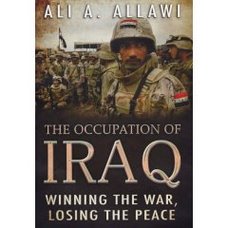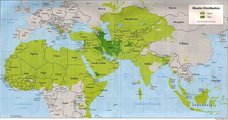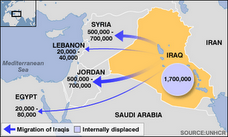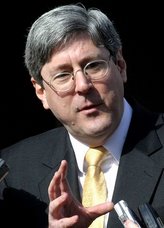(RESPONDING TO MY EMAIL SAYING I HAD GOOGLED HIM)
Sharon, Ha, I never knew how much of me was on Google.
Doc Shurley
DAILY NEWS,OPINION,AND MIDEAST UPDATES............ SEE SITE LINK FOR TIME LINE OF START UP OF IRAQ WAR AND TIME LINE OF VIETNAM WAR (1961-1975)
(RESPONDING TO MY EMAIL SAYING I HAD GOOGLED HIM)
Sharon, Ha, I never knew how much of me was on Google.
Some analysts said McConnell was sending two messages: one to the White House about what is politically viable, and one to Republican senators about how much time they will have to repair political damage, if that is necessary.
IRBIL, Jan 29 (KUNA) -- Iraqi MP for the Sadrist bloc Baha Al-Araji unveiled on Monday the near announcement of the Sadr-Kurd alliance....along with recommendations for serious cooperation seeking real national unity. The Sadr bloc delegation that is visiting Kurdistan at present, held meetings with the Kurdish leaders and discussed the Iraqi developments in general and the relations between the Sadrist bloc and the Kurdish alliance.
http://www.kuna.net.kw/Home/Story.aspx?Language=en&DSNO=947295 NEIGHBOR (Iran)
The question is no longer whether Iraq will become a beacon of democracy in transforming the entire Middle East. That was a chimera. But the question is also not whether al-Qaeda will seize power. That is not likely even in central Iraq, and through the strategy we follow on the way out, we can minimize the chances that al-Qaeda will permanently entrench itself there.

Only this president could extol the “thoughtful recommendations of the Iraq Study Group,” and then take its most far-sighted recommendation — “engage Syria and Iran” — and transform it into “threaten Syria and Iran” — when al-Qaida would like nothing better than for us to threaten Syria, and when Iranian President Mahmoud Ahmadinejad would like nothing better than to be threatened by us...
Because last night the president foolishly all but announced that we will be sending these 21,500 poor souls, but no more after that, and if the whole thing fizzles out, we’re going home.
The plan fails militarily.
....Before Mr. Bush was elected, he said nation-building was wrong for America.
"I know President Bush and I know him as a strong person that does not get affected by the media pressure, but it seems the pressure has gone to a great extent that led to the president giving this statement," Maliki said. Maliki spoke slowly and seriously for most of the conversation, but occasionally broke into a smile, such as when he was asked whether Bush needs him more than he needs Bush. This is an evil question," he said, laughing."
Intelligence Skewing re: Iran?
Larisa Alexandrovna
Monday January 8, 2007
The nomination of retired Vice Admiral John Michael "Mike" McConnell to be Director of National Intelligence is part of an effort by the Vice President to tighten the Administration’s grip on domestic intelligence and grease the wheels for a more aggressive stance towards Iran, current and former intelligence officials believe....According to officials who spoke on condition of anonymity, Negroponte’s exit followed a lengthy internal administration battle between the Office of the Vice President and the two-year-old Office of the Director of National Intelligence....
“The NIE on Iran is at issue,” said one former senior intelligence officer close to Negroponte. The National Intelligence Estimate is an interagency report that synthesizes information across all intelligence agencies on a particular topic, providing an overall assessment and analysis.




